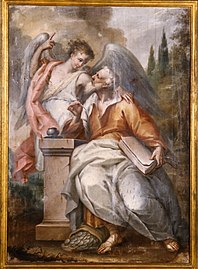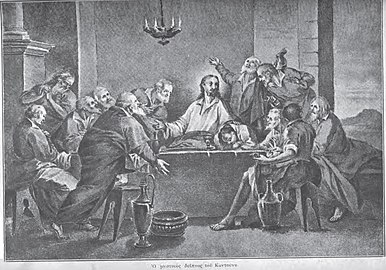Nikolaos Kantounis
Nikolaos Kantounis | |
|---|---|
 Self-portrait (date unknown) | |
| Born | 1767 |
| Died | 1834 Zakynthos |
| Nationality | Greek |
| Known for | Assumption Descent from the Cross |
| Movement | Greek Romanticism Neoclassicism Neo Hellenikos Diafotismos Modern Greek art |
Nikolaos Kantounis or Kandounis (Greek: Νικόλαος Καντούνης; 1767–1834) was a Greek priest, painter and teacher who did not follow the traditional Maniera Greca. His teacher was the famous painter Nikolaos Koutouzis. He began to incorporate the Maniera Italiana into the Heptanese School. Kantounis, Panagiotis Doxaras, Nikolaos Doxaras and Koutouzis were all prolific members of that school. Kantounis was one of the most important painters in the Neoclassical Period in Greece. He was a representative of the middle to late Modern Greek Enlightenment in Greek art. Over 164 of his paintings have survived. He is known for painting many portraits. Some of his works resemble the style of Nikolaos Doxaras. He was also a member of the secret organization for Greek Independence called the Filiki Eteria.[1][2][3][4][5]
Biography
[edit]
(late 18th century)
He was born in Zakynthos to a very wealthy and educated family. Records indicate Nikolaos was baptized on January 28, 1768.[6] His father, Ioannis, was a doctor and a famous poet.[7] His first teacher was the Greek poet Antonios Martelaos.[6]
The Greek painter, Ioannis Korais, provided his first art lessons. He also worked in the studios of Nikolaos Koutouzis, who is rumored to have expelled him out of jealousy. He would later claim to be largely self-taught.[7] His style was influenced by both Panagiotis Doxaras and Nikolaos Doxaras.[6]
In 1786, he was ordained a priest and took a position at the church of Evangelistria in Zakynthos. By 1803, he had been hired by the executive committee of Agia Paraskevi church in Zakynthos to paint 12 icons depicting theological stories.[6] Many of his church decorations have been destroyed by earthquakes.
He was a member of the secret Greek society Filiki Eteria (Society of Friends); a group dedicated to overthrowing Ottoman rule. In 1821, he was exiled by the British because of his subversive activities. They sent him to the island of Kyra, near Cephalonia. While he was there he painted a version of the Last Supper.[7][6] He was not able to return home until after the recognition of Greek Independence in 1832.
In 1823, he was honored with the rank of Grand Sakellarios and, in 1825, he was mentioned in the codex of Saint Catherine of Siena in Zakynthos. Records indicate he was paid 100 thalers to create paintings for the church.[6]
He died on April 25, 1834. He was about 66 years old and left a detailed will, which had interesting information about his life and property. Some of his students were the famous Greek painters Gerasimos Pitsamanos, Dionysios Tsokos and Dionysios Kallivokas. He was one of the earliest members of the modern Greek art period.[6]
Kantounis paintings can be found at the National Gallery of Greece,[7] the Benaki Museum,[8] the Municipal Gallery of Larissa,[9] the Teloglion Foundation of Arts[10] etc.
Gallery
[edit]-
Christ Removed From Cross
-
Portrait of Greek writer Elizabeth Moutzan-Martinegou
-
The Evangelist Matthew
-
Saint George the Dragon-Slayer
-
Descent from the Cross
-
Ascension of Jesus
-
Descent from the Cross
-
Panagiotis Samartzis (Historian)
-
Chemist Nikopoulos
-
The Last Supper
-
Priest
Notable works
[edit]- Elisabeth Moutzan-Martinegko, ca 1832 National Gallery of Athens[11]
See also
[edit]References
[edit]- ^ Hatzidakis, Manolis & Drakopoulou, Eugenia (1997). Greek painters after the fall (1450-1830) Volume B. Center for Modern Greek Studies E.I.E. pp. 62–68.
- ^ Eugenia Drakopoulou (August 24, 2021). "Kantounis Nikolaos". Institute for Neohellenic Research. Retrieved August 24, 2021.
- ^ Georgopoulou Verra, Myrto (1999). Holy Passion, Sacred Images, The Interaction of Byzantine and Western Art in Icon Painting. Athens, Greece: S.U.N.Y. The University of Binghamton. p. 36. ISBN 9789602142578.
- ^ Staff Writers (August 24, 2021). "Kantounis Nikolaos". National Gallery of Athens. Retrieved August 24, 2021.
- ^ Kakavas, George (2002). Post-Byzantium The Greek Renaissance : 15th-18th Century Treasures from the Byzantine & Christian Museum, Athens. Athens, Greece: Hellenic Ministry of Culture Onassis Cultural Center. p. 41. ISBN 9789602140536.
- ^ a b c d e f g Hatzidakis, 1997, pp 63-68
- ^ a b c d "Kantounis Nikolaos". National Gallery. Retrieved 2023-11-07.
- ^ "Νικολάου Kαντούνη (1768-1834): Προσωπογραφία ιερωμένου". Benaki Museum (in Greek).
- ^ "Καντούνης Νικόλαος, Καλλιτέχνες ψηφιακής συλλογής , Δημοτική Πινακοθήκη Λάρισας, Μουσείο Γ.Ι. Κατσίγρα". www.larissa-katsigras-gallery.gr. Retrieved 2023-11-07.
- ^ "The Foundation | Teloglion Foundation of Art A.U.Th". 2021-03-08. Archived from the original on 2021-03-08. Retrieved 2023-11-07.
- ^ Eugenia Drakopoulou (August 24, 2021). "Nikolaos Kantounis Catalog of Works". Institute for Neohellenic Research. Retrieved August 24, 2021.
External links
[edit]![]() Media related to Nikolaos Kantounis at Wikimedia Commons
Media related to Nikolaos Kantounis at Wikimedia Commons
- More paintings by Kantounis @ the "ΠΕΡΙ ΤΕΧΝΗΣ Ο ΛΟΓΟΣ" blog.










